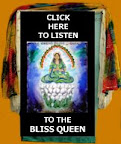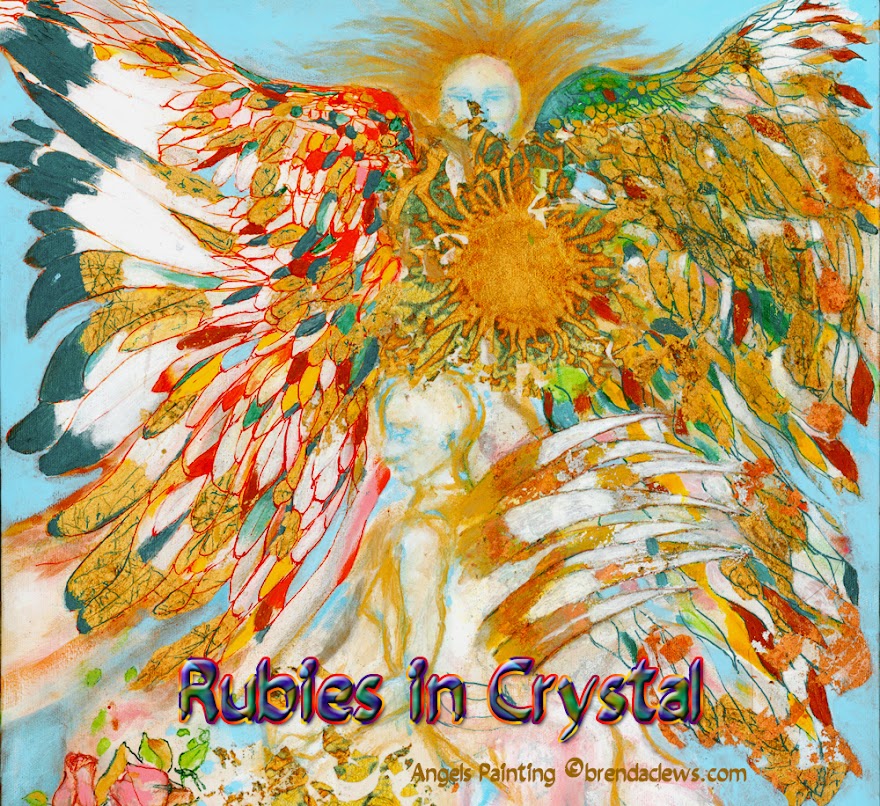, acrylic on canvas, 29.5"x35.25", & India Ink drawing on parchment paper, Brenda Clews 2003
Place of surrender,
of the softness of the lotus and the heat of its flames,
the way everything dissolves,
the way I am aroused and caressed,
barely remembering who I am,
this way of falling into what is receiving us.
That first time, I see you on the other side,
across the dance floor, dancing...
The sensual dance of the liquid fire
of flaming bliss.
A tantrayana.
In the Tibetan texts, she,
the place of the coming to be,
the arising of all existents,
of the coming and going,
the Great Bliss Queen a matrix,
1
the essence of the great expanse.
2
She rises from the water, a vision,
Jigmay Lingpa, an 18th c Tibetan visionary,
"From the mouth of the lotus was born
The swift goddess, heroic liberator
Who went forth in human form
Amid the snowy mountains of Tibet."
3
Aren't we all born from lotuses?
Aren't all lotuses bliss?
The secret history of the life
of the Queen of Tibet,
her Lute Song of the
Gandharvas,
4
an epic map to enlightenment,
her
namthar,
5 way of liberation, balancing
love and compassion,
a limitless ability to help others...
The Great Bliss Queen Dakini's mandala
of flowing awareness, flaming mansion
of bliss, an entryway
into the expanse of reality.
Imagining into,
that space, its mindfulness, this tantra,
becoming one with the generative force,
this secret path
That evening with you...
disappearing into
the empty vastness of love.
Is Buddhism an extended meditation on the self?
And mindfulness consciousness of the self in its unfolding?
This complex construction of self,
nexus of who I am, you are,
watching the process of ourselves unfold...
...if I had a stable and solid 'self' that is,
instead of this mutable, floating, ever-changing
and constantly renewed consciousness...
Yeshe Tsogyal, Great Bliss Divine Queen,
in her
Lute Song, embedded as icon,
transparent and luminous as the water,
heroine, a founder of Tibetan Buddhism,
enlightened girl, woman, Queen,
a Buddha, back there, in the 8th century,
when she comes out of the caves with her consort/lover,
where she has disappeared for months, blissing out,
from her swollen, love-bitten lips, red as flames, says,
and after the ordeals in the mountains of Tibet
meditating alone through the Winters,
without food or clothing or warmth,
where she has learnt to generate heat from within,
to draw nectar from the air,
where she has learnt not to dissolve into passion
but to allow passion to dissolve her,
Yeshe Tsogyal says,
"If there is no mingling of bliss with voidness
All is useless...
Taste rather bliss and voidness, as they rise, united!"
6
The bliss and the void...
this primal purity.
Yeshe Tsogyal does not represent awareness,
but the gift of awareness.
Do we sometimes have visions which define our lives?
Which define how we understand the way our consciousness
exists in the continuum we float in?
I am dancing with my eyes closed,
can I witness your light?
...a vision, years ago, between dream and waking,
in the black, black night,
of the nothingness on which all matter rests...
the void, the great emptiness, non-being...
the way all form, all energy collected into form,
are waves flowing on nothing,
a nothingness so deep as to be without depth,
pervasive, everywhere, what each molecule rests on,
each vibrating cell of life,
the nothingness all consuming...
That night with you, your large body enveloping mine,
your intensity, hunger,
in the passion for each other, its fire,
we undress
peeling layers
until we, tongue, touch, wet, skin sliding on skin, hot, electric
then my body disappearing into emptiness...
cheek, lip, tongue, breast, dissolving
like the dark side of the moon,
where there is no light, no air,
only the vast and open cosmos,
and can I call it terrifying, this loss, of me,
me spinning into,
crumbling into moondust under your hot breath...
Consumed into emptiness...
blissful waves of orgasms...
our bodies performing a music of light
our essence, shining,
shining through each other
making each other appear,
your touch, the serenity of you,
your breath, your body, your energy flowing,
you an anchor of light I come back to in the ocean flowing,
and then dipping back into the extinguishing...
My being is fragile, arbitrary.
I disappear into you, past you
I am floating on the other side of the cosmos
my body of bliss, waves of bliss
until only the waves of bliss remain...
a wake of bliss spreading, the clear light, like lightning
The Queen and the King cause the thunder
to roll over the mountains of Tibet.
The Queen and her consort practice
the secret tantra.
The Bliss Queen is a passionately happy deity.
In her rainbow body, the heavens bright with thousands
of spirits, she departs, wise and profound Mother, leaving
a trail of miracles like lotus petals...
...and when I meditate...
that energy, vital energy, percolating, ever-renewing,
subtle energies, delicate winds, from the unmanifest to the manifest,
creating, maintaining, dissolving, everything,
what we see, think, feel,
whispering the intention of non-being to be,
and in being dissolving again into nothingness...
vast, complex, intricate,
this febrile field of life with all its appearings and disappearings,
its passion and its cessation,
its constant, eternal flow recreating
itself every moment, anew...
© 2003 Brenda Clews
Notes
----
1 "Matrix" refers to the womb of Yeshe Tsogyal (777-837), the Great Bliss Queen, ""a womb that is reality." To know this reality, which Buddhists also call emptiness, is to give birth to enlightenment.” Anne Carolyn Klein,
Meeting the Great Bliss Queen (Boston: Beacon Press, 1995), p. 156. Similarly, in the Mahayana tradition of Buddhism,
Prajnaparamittra means ‘emptiness,’ which is synonymous with ‘great mother wisdom.’
2 Line taken from the title of the liturgy of Yeshe Tsogyal by Jigmay Lingpa (1729-98), “famous scholar-practitioner,”
Long chen sNying thig rza pod (The Very Essence of the Great Expanse), quoted in
Great Bliss Queen, ftn.3, p.263.
3 Jigmay Lingpa, quoted in
Great Bliss Queen, p.15.
4 Lady of the Lotus-Born,
The Life and Enlightenment of Yeshe Tsogyal, A Translation of The Lute Song of the Gandharvas, A Revelation in Eight Chapters of the Secret History of the Life and Enlightenment of Yeshe Tsogyal, Queen of Tibet, trans. The Padmakara Translation Group (Boston: Shambhala, 1999).
5 A namthar is a “tale of liberation,”
Lady of the Lotus-Born, p.xiii.
6 Lady of the Lotus-Born, p. 173.
Works Cited
Klein, Anne Carolyn.
Meeting the Great Bliss Queen. Boston: Beacon Press, 1995.
The Padmakara Translation Group.
Lady of the Lotus-Born, The Life and Enlightenment of Yeshe Tsogyal, A Translation of The Lute Song of the Gandharvas, A Revelation in Eight Chapters of the Secret History of the Life and Enlightenment of Yeshe Tsogyal, Queen of Tibet. Boston: Shambhala, 1999.
Extended Bibliography
Anand, Margo.
The Art of Sexual Magic. New York: G. P. Putnam’s Sons, 1995.
Arguelles, Jose and Miriam.
Mandala. Boulder, Colorado: Shambhala, 1972.
Chopel, Gedun. Trans. Jeffrey Hopkins.
Tibetan Arts of Love: Sex, Orgasm & Spiritual Healing. Ithica, New York: Snow Lion Publications, 1992.
Danielou, Alain, Trans.
The Complete Kama Sutra. Rochester, Vermont: Park Street Press, 1994.
Feuerstein, Georg.
Tantra: The Path of Ecstasy. Boston: Shambhala, 1998.
Khanna, Madhu.
Yantra: The Tantric Symbol of Cosmic Unity. London: Thames & Hudson, 1979.
King, Francis.
Tantra: The Way of Action. Rochester, Vermont: Destiny Books, 1990.
Lacroix, Nitya.
The Art of Tantric Sex. London: Dorling Kindersley, 1977.
Mann, A.T., and Lyle, Jane.
Sacred Sexuality. Rockport, Massachusetts: Element Books, 1995.
Rawson, Philip.
The Art of Tantra. Greenwich, Connecticut: New York Graphic Society, 1973.
Rawson, Philip.
The Art of Tantra. New York: Oxford University Press, 1978.
Shaw, Miranda.
Passionate Enlightenment: Women in Tantric Buddhism. Princeton: New Jersey: Princeton University Press, 1994.
This poem was originally presented at, Mothering, Religion and Spirituality, October 24-26, 2003, York University, Toronto. It's been read at a number of venues, York University, the University of Toronto, and the Victory Cafe in Toronto, since then.



